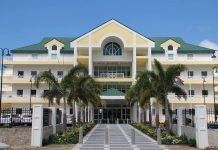By Antigua Chronicle
CARICOM Foreign Ministers have put measures in place for closer cooperation with Sweden and the Netherlands even as they seek to place issues impacting the development of Small Island Developing and Low-lying States (SIDS) in the spotlight.
The Ministers at their just concluded 19th Meeting of the Council for Foreign and Community Relations (COFCOR), in St. Vincent and the Grenadines, met with their counterparts from the two European Union (EU) Member States.
Aware of Netherlands’ strategic position as the current President of the European Union, COFCOR engaged the country’s Minister of Foreign Affairs Bert Koenders on climate change, particularly its impact on SIDS and low lying States. While acknowledging the diplomatic success of COP21, the urgency of operationalisation of the Agreement was stressed. The concerns of the Community over blacklisting by EU Member States, and the withdrawal of correspondent banking services, both of which had an adverse impact on CARICOM States were also presented to the Minister.
Discussions with Swedish Foreign Minister Margot Wallstrom centered on issues such as climate change, renewable energy, water management, ocean security, citizen security, as well as a proposal by Sweden and the Nordic countries to conclude a Memorandum of Understanding to facilitate cooperation in a range of areas.
According to the Communiqué issued at the end of the Meeting, Foreign Ministers also considered CARICOM’s relations with a number of other Third States, and regional groupings, as well as with important development partners with whom the Region enjoys long-standing ties. In acknowledging that many of these relationships were undergoing dynamic changes, they considered how best to position CARICOM to take advantage of these changing realities. They also deliberated on the Region’s priorities and challenges within key regional, hemispheric and multilateral bodies including the United Nations, the ACS and CELAC.
In relation to the United Nations, the COFCOR recalled the active participation of the Community in the successful meetings in 2015 on Financing for Development, the 2030 Agenda for Sustainable Development, and COP21, noting the significance of the outcomes or CARICOM SIDS. With regard to climate change, the Communique noted that Foreign Ministers encouraged the early ratification of the Paris Agreement as well as the need for mechanisms to ensure access to climate financing such as the Green Climate Fund.
Given the importance of the maritime environment to the sustainable development of SIDS, the Ministers discussed the Region’s response to matters relating to the United Nations Convention on the Law of the Sea (UNCLOS) on the Conservation and Sustainable Use of Marine Biological Diversity of Areas Beyond National Jurisdiction (BBNJ). In this regard, they called for greater representation of CARICOM Member States at the annual meeting of the International Sea Bed Authority (ISA).
The Ministers pledged the Community’s continued commitment to the work of the Association of Caribbean States (ACS). They welcomed Cuba’s appointment as Chair of the Executive Board of the ACS, and their hosting of the Seventh ACS Summit scheduled for 4 June 2016 in Cuba, and reaffirmed the importance of CARICOM’s participation at the highest level.
The Ministers also reflected on the activities that CELAC will undertake in 2016 following the Fourth CELAC Summit which took place in Ecuador in January 2016. They articulated CARICOM’s priorities within CELAC, including matters critical to Small Island Developing States and low-lying coastal States, implementation of recently concluded global pacts such as the 2030 Agenda for Sustainable Development, COP21 and Financing for Development, cooperation with sub-regional integration mechanisms and with extra-regional partners.
In sombre reflection, the Ministers reiterated the Community’s solidarity with Ecuador following the devastating earthquake and aftershocks that ravaged that country in April 2016, and expressed condolences to the families of the victims.
The Ministers also recognised the International Decade for People of African Descent as an opportunity to bring awareness to the challenges facing persons of African Descent and for pursuing the case for reparation.
They also noted the observance of the Tenth Anniversary of the Convention on the Rights of Persons with Disabilities (CRPD) and the importance of the adoption of the Petion-Ville Declaration of 2013 by CARICOM Member States. In this vein, they underlined the importance of implementing the proposals of the Declaration in ensuring the rights of differently-abled persons in an inclusive society for all.


































